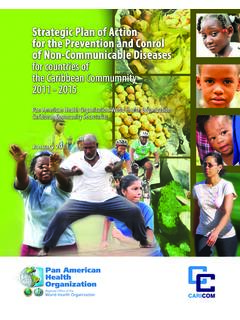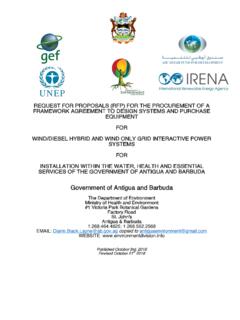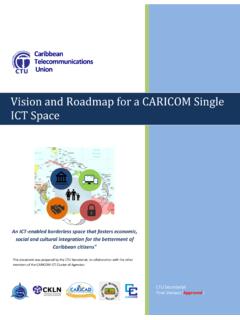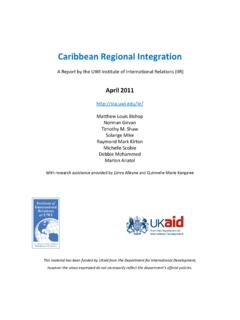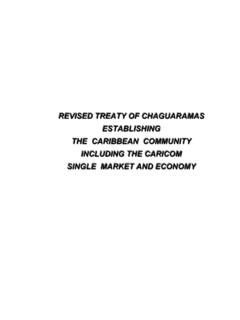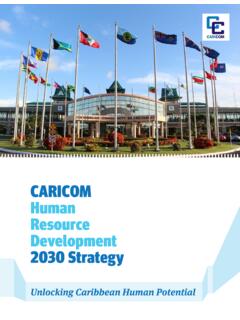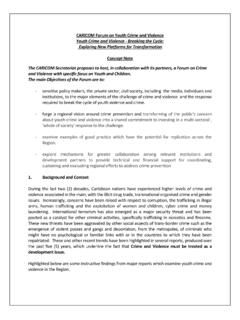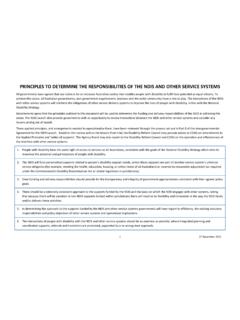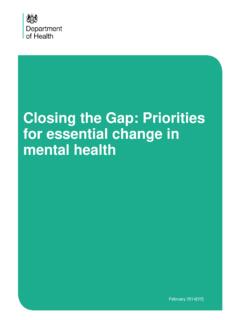Transcription of Curriculum for Registered Nursing Education Programme …
1 Curriculum for Registered Nursing Education Programme Nursing CARICOM Countries Curriculum FOR Registered Nursing Education Programme Nursing (As approved by the 21st Meeting of the COHSOD in 2011) CARICOM COUNTRIES Caribbean Community Secretariat Bank of Guyana Building Avenue of the Republic Georgetown, Guyana Curriculum for Registered Nursing Education Programme [for] Nursing [in] CARICOM Countries Caribbean Community Secretariat, 2011 All rights reserved. No part of this publication may be reproduced, stored in a retrieval system, or transmitted in any form by any means, electronic, mechanical, photocopying, recording or otherwise without the prior permission of the publisher. Published by Caribbean Community (CARICOM) Secretariat Turkeyen, Box 10827 Georgetown, Guyana ISBN 978-976-600-360-9 (Pbk) ISBN 978-976-600-361-6 (CD-Rom) Approved by the Twenty-First Meeting of the Council for Human and Social Development, held in Guyana on 15-16 April 2011.
2 1 CONTENTS ACKNOWLEDGEMENT 2 PHILOSOPHY OF Nursing 3 Curriculum AIM 5 THEORETICAL FRAMEWORK 5 Nursing DOMAINS 7 Programme COMPETENCIES 9 Curriculum OUTLINE: A. COURSES OFFERED 13 B. Programme STRUCTURE SUGGESTED CREDITS 14 C. SUGGESTED Programme HOURS 15 PRE- Nursing COURSES PNC 101 - Anatomy 16 PNC 102 - Physiology 19 PNC 103 - Introduction to Sociology 22 PNC 104 - Introduction to Psychology 25 PNC 105 - Medical Microbiology 28 PNC 106 - Foundation of Chemistry
3 31 PNC 107 - Pathophysiology 34 PNC 108 - Introduction to Pharmacology 39 PNC 109 - Nutrition 44 PNC 110 - health Promotion and Maintenance of Wellness 47 PNC 111 - Biochemistry 50 PNC 112 - Epidemiology 53 Nursing COURSES NC 201 - Nursing Professionalism 57 NC 202 - The Nursing Process 60 NC 203 - health Assessment 63 NC 204 - Caring for the Child-Bearing Family 66 NC 205 - Adult health Nursing I 20-64 years 70 NC 206 - Community Nursing 73 NC 207 - Nursing Care I month 19 years 77 NC 208 - Adult health Nursing II 20 64 years 80 NC 209 - mental health Nursing
4 85 NC 210 - Nursing Research 88 NC 211 - Nursing Care of the Older Persons 65 years and over 91 NC 212 - Specialised Nursing 95 NC 213 - Nursing Management 98 NC 214 - Nursing Leadership 102 NC 215 - Nursing Clinical Elective 105 NC 216 - Nursing Practicum 107 BIBLIOGRAPHY 109 2 ACKNOWLEDGEMENT The development of this Curriculum for Bachelor of Science, Nursing , undergraduate Programme in the CARICOM region is indeed a milestone in the history of Nursing for the Region.
5 Deepest appreciation must be extended to: - The Regional Nursing Body for their leadership and visioning for the CARICOM Region, and for initiating the development of this Curriculum and for lobbying for the movement of Nursing Education into institutions of higher learning. - The CARICOM secretariat for the resources and guidance during the revision stages. - The General Nursing Councils of the region for their interest and commitment to the regulation of Education and practice of Nursing including their commitment to Regional Examination for Nurse Registration (RENR). - The Nursing faculties of the various educational institutions for rising to the challenges ensuing from the advancement of Nursing Education within Schools, Colleges and Universities. - The technocrats who persevered to the realization of this document. - The secretary and support staff without whose contributions the process could not advanced.
6 3 PHILOSOPHY OF Nursing We believe that: Individuals are unique human beings with intrinsic worth and dignity who live and function within the unit of families and communities and have the right to enjoy optimum health . Individuals are also complex open systems who are in constant interaction with an internal and external environment. The individual, based on his or her developmental level, exercises the right to choices in maintaining his/her health status, in keeping with his or her perceptions, expectations and needs. These rights of the individual and diversity in expression are respected and valued by the professional nurse in the delivery of health care. The Family is the basic unit of society and should be considered when planning and programming strategies and interventions geared to the health promotion and maintenance of wellness.
7 The family interacts within socio-cultural, political, and economic boundaries, and members share common values, beliefs and practices, which impact their health status. health is a dynamic holistic process in which the individual or family interact with physiological, psychological, cultural and spiritual stimuli in order to achieve maximum potential. health is also the actualization of inherent and acquired human potential through goal-directed behavior, competent self-care and satisfying relationships with others. Adjustments are made along a health illness continuum as needed to maintain structural integrity and to effect harmony with the environment. health Care is the process of assisting the individual, family and community to attain or maintain a state of optimum wellness or to adjust to a comfortable position on the health Illness continuum. It is a basic human right and a priority for individuals, families and communities.
8 health Care should be available, accessible, affordable, comprehensive, continuous, coordinated and delivered by trained competent members of a health team. health Care programmes must reflect the health priorities, as well as the socio economic needs of the society, and must be delivered in a way that will benefit the greater majority of the peoples of the society. Nurses are professionals who have completed a program of Education in a recognized educational institution and are qualified, Registered and licensed to practice Nursing . The nurse, as a professional, is capable of critical inquiry, sound clinical judgment and ethical decision- making. Nurses function independently and interdependently within the multi-disciplinary health team. Nursing is a practice based discipline, built upon the contribution of many nurse theorists as well as inputs from several other scientific disciplines.
9 Nursing makes a distinctive contribution to the maintenance and promotion of health of individuals, families communities and nations. Nursing is administered through the use of the Nursing Process, which allows for critical thinking, progressive inquiry and informed decision making. Nursing practice integrates multiple role expectations, is committed to evidence based practice and improved outcomes and is directed towards the achievement of optimal functioning of the patient/client. Nursing Education is a continuous process. Nursing Education programmes are based on scientific principles; provide a broad and sound foundation for the effective practice of Nursing , 4and a basis for continuing development in Nursing . These programmes, must of necessity focus on the common health problems within the region and reflect the current evidence-based trends in Nursing practice. Professional Nursing Education programmes in the region should be at the first-degree level and should prepare graduates who are capable of providing leadership and management as well as professional reflection and visioning.
10 Learning is a life long process of developing individual s potential through a spirit of critical inquiry, conscious or unconscious change in behavior. Learning is the result of a life- long, dynamic process by which the learner acquire new skills and or attitudes that can be measured and can occur at anytime or in any place due to exposure to environmental stimuli. Learning is enhanced through collaborative interaction with other disciplines Learners bring unique and diverse knowledge and experiences that serve as a resource to the educational process. Learners are encouraged to be innovative, to challenge assumptions and be committed to the pursuit of knowledge. The pursuit of knowledge is the key thread that crosses the entire Curriculum and will enable the learner to critically evaluate and integrate theory, research and current practice to foster lifelong growth. Teaching is the process of instilling in the learner the concepts, skills and quest for life-long pursuit of knowledge and capacities.
